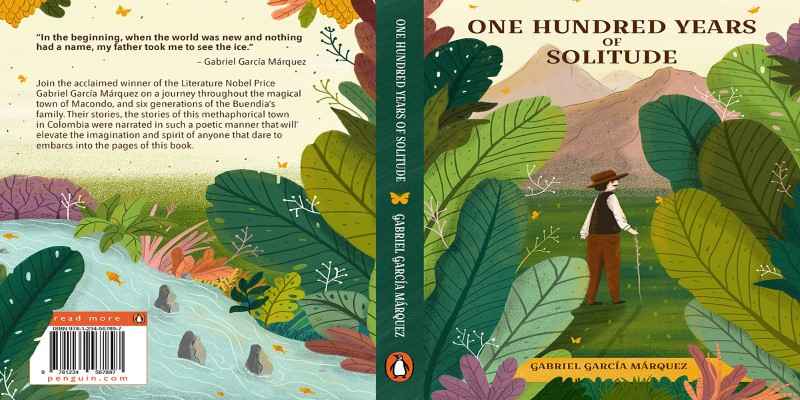"One Hundred Years of Solitude" by Gabriel Garcia Marquez is a captivating novel that weaves a tapestry of magical realism, exploring the Buendía family's multigenerational saga in the fictional town of Macondo. Let's delve into the book's publication history, major themes, and notable characters, along with any adaptations for the screen.
Gabriel Garcia Marquez, the esteemed Colombian author, crafted the mesmerizing narrative of "One Hundred Years of Solitude" in his native Spanish. The novel debuted under the title "Cien años de Soledad," laying the foundation for the enchanting tale that unfolds in the fictional town of Macondo.
The pivotal moment in the novel's journey came with the expert translation by Gregory Rabassa. With linguistic finesse, Rabassa translated Marquez's intricate prose into English, ensuring that the magic and beauty of the original Spanish text remained intact. This translation opened the door for a broader, English-speaking audience to experience the allure of Macondo and the Buendía family saga.
The English version of "One Hundred Years of Solitude" garnered rapid acclaim on a global scale. Readers worldwide embraced Marquez's storytelling prowess and the unique blend of magical realism that permeates the narrative. This widespread success solidified Gabriel Garcia Marquez's standing as a leading figure in the magical realism literary movement, showcasing his ability to transcend cultural and linguistic boundaries.
The novel's publication history, from its Spanish origins to its global recognition through translation, highlights its universal appeal. "One Hundred Years of Solitude" continues to be celebrated as a literary triumph, leaving an enduring legacy that transcends time and cultural differences. The exploration of love, power, and the cyclical nature of history resonates with readers worldwide, cementing the novel's place as a timeless masterpiece in the realm of literature.
Top of Form
Magical Realism: The novel is renowned for its use of magical realism, blending fantastical elements with everyday life. Marquez seamlessly integrates mythical occurrences, such as flying carpets and levitating priests, into the Buendía family's history. This technique challenges the boundaries between reality and imagination.
Time and Memory: "One Hundred Years of Solitude" explores the cyclical nature of time and the impact of memory on the present. Events repeat across generations, emphasizing past, present, and future interconnectedness. The Buendía family grapples with the consequences of their ancestors' actions, creating a rich tapestry of time-bound narratives.
Political Allegory: Set against the backdrop of Latin American political turmoil, the novel is about the region's history. Marquez subtly critiques the social and political landscape, addressing themes of power, corruption, and the cyclical nature of political revolutions.
Isolation and Solitude: The title reflects the novel's recurring theme of solitude. Characters often experience emotional and existential isolation, mirroring Macondo's more extensive societal isolation. The narrative explores the consequences of individual choices and the resulting solitude that permeates the characters' lives.

Meet the individuals who breathe life into the enchanting world of "One Hundred Years of Solitude."
José Arcadio Buendía serves as the patriarch of the Buendía family. A man of lofty ambitions and boundless idealism, he is the visionary founder of Macondo, the town central to the novel. José Arcadio's insatiable curiosity leads him into the world of alchemy and knowledge, shaping his family's destiny for generations. His pursuits oscillate between brilliance and obsession, leaving an indelible mark on the Buendía legacy.
As José Arcadio Buendía's wife, Úrsula Iguarán emerges as the resilient and pragmatic matriarch of the Buendía family. Her enduring longevity and strong will anchor the family through the ebb and flow of time. Úrsula witnesses the rise and fall of the Buendía dynasty, navigating challenges with unwavering determination. Her character symbolizes the backbone of the family, providing stability amidst the tumultuous events that unfold in Macondo.
Aureliano Buendía, one of José Arcadio's sons, emerges as a complex character deeply entwined with the political turmoil of the novel. As a military leader and insomniac, Aureliano plays a pivotal role in the family's history. His internal struggles and involvement in revolutionary movements add layers to his character, reflecting the broader themes of power and destiny explored in "One Hundred Years of Solitude." Aureliano's journey becomes a significant thread in the intricate tapestry of the Buendía saga.
Adopted into the Buendía family, Rebeca brings an air of mystery to Macondo. Her origins shrouded in secrecy, Rebeca's penchant for eating earth introduces an element of magical realism to the narrative. Her presence in the Buendía household brings both wonder and tragedy to the family dynamics.
Rebeca's character is a poignant reminder of the fantastical elements woven into "One Hundred Years of Solitude," adding depth and intrigue to the unfolding story.
Although a cinematic rendition of "One Hundred Years of Solitude" is yet to grace the screen, an exciting development arose in 2019 when Netflix secured the rights to produce a series based on Gabriel Garcia Marquez's novel. Spearheaded by the author's sons, Rodrigo Garcia and Gonzalo Garcia Barcha, the project aspires to translate Marquez's intricate narrative onto the visual canvas.
This adaptation holds the promise of introducing the timeless tale to a fresh audience while potentially capturing the nuanced essence of the novel through the immersive medium of television. Under the guidance of Marquez's family, the Netflix series stands as a compelling endeavor to breathe visual life into the rich tapestry of Macondo and the Buendía family's captivating journey.

"One Hundred Years of Solitude" remains a literary masterpiece transcending cultural boundaries. Its publication history, major themes, and memorable characters contribute to its enduring appeal. As the novel continues to captivate readers worldwide, the prospect of a television adaptation adds a new dimension to the legacy of Gabriel Garcia Marquez's magnum opus.

By Alice Ellis/Apr 16, 2024

By Mark Allen/Mar 06, 2024

By Eleanor/Apr 28, 2024

By Pamela Andrew/Feb 28, 2025

By Vicky Louisa/Oct 31, 2024

By Eleanor/Feb 21, 2024

By Frederica/Dec 02, 2024

By Lucy Lee/Apr 05, 2024

By Eleanor/Mar 12, 2025

By Frederica/Apr 20, 2024

By Sid Leonard/Jun 17, 2025

By Triston Martin/Oct 29, 2024